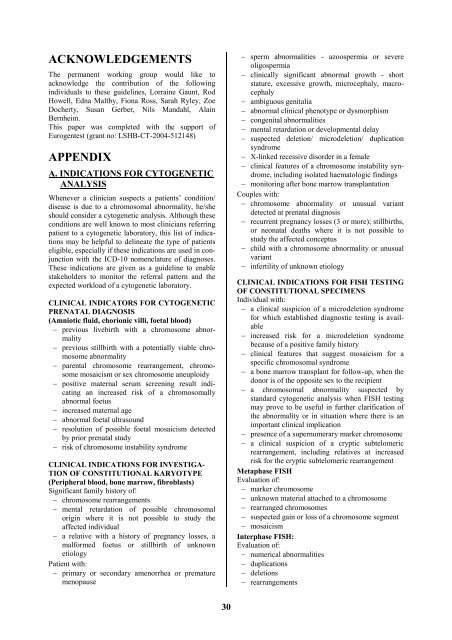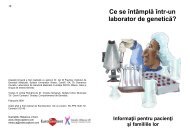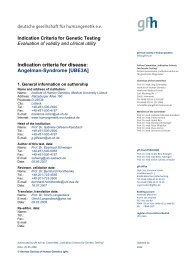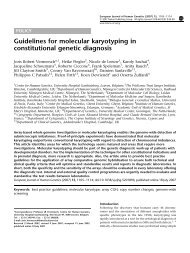Cytogenetic Guidelines and Quality Assurance - EuroGentest
Cytogenetic Guidelines and Quality Assurance - EuroGentest
Cytogenetic Guidelines and Quality Assurance - EuroGentest
Create successful ePaper yourself
Turn your PDF publications into a flip-book with our unique Google optimized e-Paper software.
ACKNOWLEDGEMENTS<br />
The permanent working group would like to<br />
acknowledge the contribution of the following<br />
individuals to these guidelines, Lorraine Gaunt, Rod<br />
Howell, Edna Maltby, Fiona Ross, Sarah Ryley, Zoe<br />
Docherty, Susan Gerber, Nils M<strong>and</strong>ahl, Alain<br />
Bernheim.<br />
This paper was completed with the support of<br />
Eurogentest (grant no: LSHB-CT-2004-512148)<br />
APPENDIX<br />
A. INDICATIONS FOR CYTOGENETIC<br />
ANALYSIS<br />
Whenever a clinician suspects a patients’ condition/<br />
disease is due to a chromosomal abnormality, he/she<br />
should consider a cytogenetic analysis. Although these<br />
conditions are well known to most clinicians referring<br />
patient to a cytogenetic laboratory, this list of indications<br />
may be helpful to delineate the type of patients<br />
eligible, especially if these indications are used in conjunction<br />
with the ICD-10 nomenclature of diagnoses.<br />
These indications are given as a guideline to enable<br />
stakeholders to monitor the referral pattern <strong>and</strong> the<br />
expected workload of a cytogenetic laboratory.<br />
CLINICAL INDICATORS FOR CYTOGENETIC<br />
PRENATAL DIAGNOSIS<br />
(Amniotic fluid, chorionic villi, foetal blood)<br />
previous livebirth with a chromosome abnormality<br />
previous stillbirth with a potentially viable chromosome<br />
abnormality<br />
parental chromosome rearrangement, chromosome<br />
mosaicism or sex chromosome aneuploidy<br />
positive maternal serum screening result indicating<br />
an increased risk of a chromosomally<br />
abnormal foetus<br />
increased maternal age<br />
abnormal foetal ultrasound<br />
resolution of possible foetal mosaicism detected<br />
by prior prenatal study<br />
risk of chromosome instability syndrome<br />
CLINICAL INDICATIONS FOR INVESTIGA-<br />
TION OF CONSTITUTIONAL KARYOTYPE<br />
(Peripheral blood, bone marrow, fibroblasts)<br />
Significant family history of:<br />
chromosome rearrangements<br />
mental retardation of possible chromosomal<br />
origin where it is not possible to study the<br />
affected individual<br />
a relative with a history of pregnancy losses, a<br />
malformed foetus or stillbirth of unknown<br />
etiology<br />
Patient with:<br />
primary or secondary amenorrhea or premature<br />
menopause<br />
30<br />
sperm abnormalities - azoospermia or severe<br />
oligospermia<br />
clinically significant abnormal growth - short<br />
stature, excessive growth, microcephaly, macrocephaly<br />
ambiguous genitalia<br />
abnormal clinical phenotype or dysmorphism<br />
congenital abnormalities<br />
mental retardation or developmental delay<br />
suspected deletion/ microdeletion/ duplication<br />
syndrome<br />
X-linked recessive disorder in a female<br />
clinical features of a chromosome instability syndrome,<br />
including isolated haematologic findings<br />
monitoring after bone marrow transplantation<br />
Couples with:<br />
chromosome abnormality or unusual variant<br />
detected at prenatal diagnosis<br />
recurrent pregnancy losses (3 or more); stillbirths,<br />
or neonatal deaths where it is not possible to<br />
study the affected conceptus<br />
child with a chromosome abnormality or unusual<br />
variant<br />
infertility of unknown etiology<br />
CLINICAL INDICATIONS FOR FISH TESTING<br />
OF CONSTITUTIONAL SPECIMENS<br />
Individual with:<br />
a clinical suspicion of a microdeletion syndrome<br />
for which established diagnostic testing is available<br />
increased risk for a microdeletion syndrome<br />
because of a positive family history<br />
clinical features that suggest mosaicism for a<br />
specific chromosomal syndrome<br />
a bone marrow transplant for follow-up, when the<br />
donor is of the opposite sex to the recipient<br />
a chromosomal abnormality suspected by<br />
st<strong>and</strong>ard cytogenetic analysis when FISH testing<br />
may prove to be useful in further clarification of<br />
the abnormality or in situation where there is an<br />
important clinical implication<br />
presence of a supernumerary marker chromosome<br />
a clinical suspicion of a cryptic subtelomeric<br />
rearrangement, including relatives at increased<br />
risk for the cryptic subtelomeric rearrangement<br />
Metaphase FISH<br />
Evaluation of:<br />
marker chromosome<br />
unknown material attached to a chromosome<br />
rearranged chromosomes<br />
suspected gain or loss of a chromosome segment<br />
mosaicism<br />
Interphase FISH:<br />
Evaluation of:<br />
numerical abnormalities<br />
duplications<br />
deletions<br />
rearrangements















